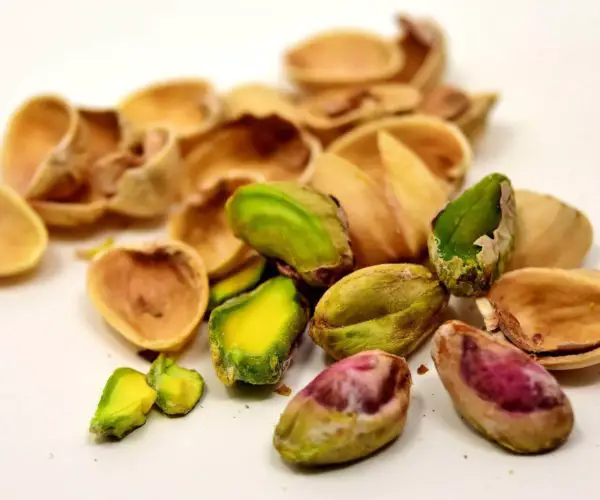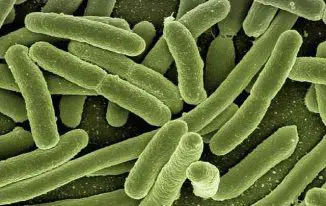13 Major Side Effects Of Eating Too Many Pistachios (Pista)
Pistachio is a delicious and healthy nut of the pistachios tree and is a member of the cashew family. They are native to Asia but are now produced and consumed in many parts of the world. Pistachios provide many health and beauty benefits as they are rich in essential nutrients. However, there are some side effects of eating too many pistachios and in this article, we will know about them.
Side Effects Of Eating Too Many Pistachios
Some major pistachios’ side effects are as follows.

(1) Promote Weight Gain
Eating pistachios moderately promotes weight loss, as they have dietary fibers that provide stomach satiety and controls overeating, a major cause of obesity.
They are a wonderful snack and provide us with energy.
But pistachios are high in calories and eating too many pistachios may promote weight gain because of their high calories.
Eating 100 grams of pistachios provides 562 calories of energy and fulfills over 25 percent of the daily calorie requirement of the body.
Also, sometimes pistachios are salted to enhance flavor and to promote overeating ( Sales !!).
For proper weight management, eat pistachios moderately and avoid salted pistachios.
(2) May Cause High Blood Pressure
Hypertension or high blood pressure is a common health condition that affects millions around the world and is a leading cause of cardiovascular problems.
Pistachios contain potassium, a natural vasodilator that relaxes blood vessels improves blood circulation, and provides relief from hypertension or high blood pressure.
Overconsuming pistachios may drop our blood pressure below the healthy range and cause lightheadedness, feeling sick, blurred vision, confusion, general weakness, and fainting, etc.

On the other hand, salted and roasted pistachios are generally high in sodium and fat and may increase the risk of hypertension and other cardiovascular problems.
To stay safe, eat unsalted pistachios in moderatation and avoid salted pistachios.
If you take blood pressure medication, have a word with your doctor before including any kind of pistachios in your diet and ensure there’s no food-drug interference.
[irp posts=”15567″ ]
(3) May Cause Gastrointestinal Problems In Some Individuals
Dietary fibers in pistachios act as a natural laxative, improve bowel movement and relieve constipation and other digestive problems like abdominal pain, gas, bloating, and flatulence, etc.
However, eating too many pistachios may overstimulate the bowel and cause intestinal gas, intestinal blockage, abdominal pain, and diarrhea.
“Fructan” present in the pistachios may cause allergic reactions to some individuals and give rise to gastrointestinal problems like bloating, diarrhea, constipation, flatulence, and abdominal pain, etc.
[irp posts=”15628″ ]
(4) May Cause Tree Nut Allergic Reactions
Avoid pistachios if you have a tree nut allergy.
Individuals who are allergic to tree nuts like almonds, walnuts, cashews, and hazelnuts are likely to be allergic to pistachios.
Tree nut allergy may cause abdominal pain, diarrhea, nausea, cramps, vomiting, difficulty in swallowing, itching of mouth, throat, eyes, skin, and other areas, nasal congestion, and difficulty in breathing, etc.
In serious cases, tree nut allergy may cause anaphylaxis, a severe potentially life threatening allergic reaction.

(5) Is Bad For People Suffering From Kidney Problems
Pistachios contain potassium, a vital mineral that regulates blood pressure and provides other benefits such as providing relief from stress and anxiety, improving metabolism, maintaining electrolyte balance, improving nerve functions, and reducing the risk of heart and kidney disorders.
However, overeating pistachios may cause potassium overload on the kidneys and makes it difficult for the kidneys to get rid of excess potassium.
High potassium levels may increase the risk of nausea, weakness, slow pulse, irregular heartbeat, heart failure, dehydration, type-1 diabetes, Addison’s disease, and internal bleeding.
[irp posts=”15612″ ]
(6) May Increase The Risk Of Kidney Stones
Pistachios contain a moderate amount of oxalates and methionine.
Eating too many pistachios may increase the risk of kidney stones as oxalates in pistachios may bind with minerals such as calcium and potassium to form calcium oxalates and potassium oxalates.
Methionine in pistachios may convert to cysteine and form cystine kidney stones.
(7) May Cause Aflatoxin Allergy
Pistachios are likely to be contaminated by Aflatoxin, a carcinogen produced by Fungus Aspergillus flavus during the growth and storage of pistachios in the moist and warm environment.
Long-term consumption of pistachios contaminated by aflatoxin may increase the risk of liver cancer and hepatitis B.
Roasting pistachios may significantly reduce the risk of aflatoxin.
[irp posts=”15617″ ]
(8) Risk Of Being Contaminated By Navel Orangeworm (NOW)
Pistachios are at risk of being contaminated by Navel Orangeworm (Now), which appears in the pistachio seed or between the seed and shell.
This cream-colored, orange or red worm is about 25 mm long and may damage the nutmeat of pistachios.
Pistachios contaminated by Navel Orangeworm are at a higher risk of being contaminated by Aspergillus Fungi that produce Aflatoxin.
(9) Risk Of Being Contaminated By Bacterium Salmonella
Pistachios are also at a higher risk of being contaminated by the bacterium salmonella.

It may cause diarrhea, high temperature, and gastrointestinal problems and may be fatal for infants, the elderly, and people with weak immune systems.
Proper roasting of pistachios may kill bacterium salmonella, but improper roasting may even contaminate the uncontaminated pistachios ( due to contact with contaminated pistachios).
(10) Increased Risk Of Pesticides And Insecticides
Pistachios are often treated with pesticides and insecticides to protect them from the attacks of pests and insects.
Consuming pesticides laden pistachios without thoroughly cleaning them may cause vomiting, diarrhea, nausea, and other allergic reactions.
(11) Increased Risk Of Acrylamide
Roasting pistachios reduce the risk of aflatoxin and salmonella bacteria, but during the roasting process pistachios form acrylamides.
Acrylamide is a probable carcinogen that may increase the risk of cancers in humans.
(12) High Manganese Risk
Pistachios contain manganese, a trace mineral that helps in the formation of connective tissues helps calcium absorption, regulates blood sugar, metabolizes fats and carbohydrates, and promotes proper functioning of thyroid glands, etc.
But too much manganese may cause headaches, tremors, loss of appetite, leg cramps, hallucination, and neurological disorders.
Manganese-rich food is not suitable for people suffering from Parkinsonism, hypermagnesemia, polycythemia, and chronic liver diseases, etc.
Eat pistachios in moderation to avoid the risk of manganese overload.
If you are already getting enough manganese from your diet or if you are taking manganese supplements, be watchful of your pistachios intake.
(13) Too Much Fiber Is Bad For Stomach
The laxative properties of dietary fibers in pistachios improve bowel movement and relieve constipation and other digestive problems like abdominal pain, gas, bloating, and flatulence, etc.
However, excess dietary fibers may overstimulate the bowel and increase the risk of diarrhea. It may also cause intestinal gas, intestinal blockage, abdominal pain, and poor absorption of nutrients, etc.
[irp posts=”280″ ]
Frequently Asked Questions
Some frequently asked questions about eating pistachios are as follows:
(1) How many pistachios to eat per day?
Generally speaking, it’s safe to eat a handful or up to 1.5-ounce pistachios per day. Eating many pistachios in a short time may give rise to side effects ranging from weight gain to kidney problems.
(2) Can eating pistachios kill you?
Pistachios are safe for most people and they can enjoy pistachios without any issue. However, if you are allergic to pistachios, pistachios may cause allergic reactions such as abdominal pain, nausea, cramping, difficulty in breathing, vomiting, itchiness in the mouth, lips, and tongue, breathing difficulty, etc.
In some cases, it may cause anaphylaxis, a severe potentially life threatening allergic reaction that may kill the person.
(3) Is it safe to eat pistachios at night?
Yes, it’s safe and beneficial to eat pistachios at night as vitamin B6 and magnesium in pistachios promote quality sleep.
American pistachios contain melatonin, an essential sleep hormone that regulates the sleep cycle.
(4) What happens when you eat too many pistachios?
Eating Too Many pistachios can cause pistachios side effects. This may include weight gain, high blood pressure, gastrointestinal problems, kidney problems, pistachios allergy, and increased risk of microbial infections.
(5) Can Pistachios Be Toxic?
Pistachios and pistachios shells are not generally toxic. However, pistachios may develop aflatoxins if they are not properly harvested and stored.
Aflatoxins are carcinogenic and may have a deadly effect on consumption. To stay safe, eat pistachios that are harvested and stored properly.
Avoid pistachios that may have gone rancid and have a bad odor or bad taste.
(6) Do pistachios Reduce Belly Fat?
Pistachios may promote weight loss as they contain dietary fibers and omega fatty acids. These compounds provide stomach satiety and control overeating, a major cause of obesity.
As per a 2020 study, a daily serving of 1.5 ounces of pistachios helps reduce body mass index and waist circumference in males and females with obesity.
(7) Can Eating Too Many Pistachios Cause Diarrhea?
Eating too many pistachios may cause diarrhea as dietary fibers in pistachios may overstimulate the bowel muscles. It may also cause abdominal pain, intestinal gas, intestinal bloating, and poor absorption of nutrients.
Also, “Fructan” in pistachios is not suitable for some individuals and may cause gastrointestinal problems like diarrhea, abdominal pain, and flatulence, etc.
(8) Can Eating Too Many Pistachios Upset Your Stomach
Yes, eating too many pistachios may upset our stomach as the dietary fibers in pistachios may cause abdominal pain, diarrhea, and stomach discomfort.
Also, some individuals might be allergic to “Fructan” in pistachios and may experience abdominal pain and stomach discomfort on eating pistachios.
(9) Can Eating Too Many Pistachios Cause Weight Gain?
Overeating pistachios may cause weight gain because of their high caloric value.
However, moderate intake of pistachios may promote weight loss as dietary fibers and Omega fatty acids may provide stomach satisfy which controls overeating, a major cause of obesity.
(10) Can Eating Too Many Pistachios give you headaches?
Overeating pistachios may give you headaches because of tyramine. Also, pistachios are often salted to make them delicious. The salt present in the pistachios may cause dehydration, a major trigger for headaches.
(11) Can eating too many pistachios keep you awake?
Vitamin B6, magnesium, and protein in pistachios help in enjoying quality sleep. However, overconsuming pistachios may keep you awake at night making it difficult to sleep.
(12) Can eating too many pistachios give you gas and bloating?
Yes, eating too many pistachios may cause gas and bloating because of high dietary fibers.
(13) Can eating too many pistachios make you constipated?
Dietary fibers in pistachios absorb excess water from our intestines and stimulate bowel movement. However, overconsuming pistachios without drinking plenty of water may absorb too much water from the intestines, making it difficult for the stool to pass. This may harden our stool and increase constipation risk.
Disclaimer
The information contained in the post is for general purpose only and shouldn’t be considered as medical advice or as an alternative to medical advice. Although I’ve tried my best to keep the information contained in this post as accurate and updated as possible, I make no guarantee of the accurateness of the same.
P.S- Consider sharing this post, if you find it useful and/or interesting.
